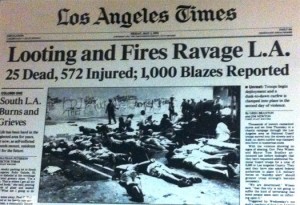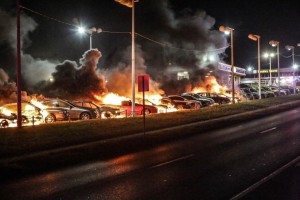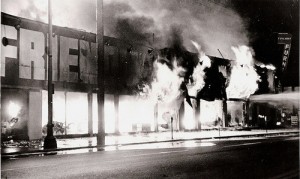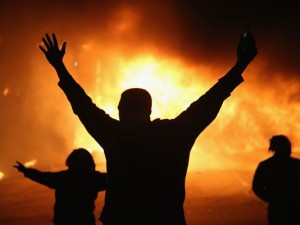About the Author – Tom Osborne, of Kalispell, served 25 years with the Los Angeles Police Department and another 30 years as a police management and training consultant. He also has 35 years experience as adjunct instructor in the School of Public Administration at the University of Southern California.
The real tragedy
Ex-L.A. cop describes challenge of policing black America
By Tom Osborne – First published in the Daily Inter Lake newspaper in Montana
I’m not black, so obviously I don’t know what it’s like to be black. However, I had the privilege to be the commander of Southeast Area, our newest, at the time, police station in Watts, California. This station, which opened over 30 years ago, was responsible for providing police services to the Los Angeles Police Department’s most heavily populated black community.
I would find it inconceivable that anyone in that position could not become very familiar with, and somewhat understanding of, the many factors involved in policing a black community in inner-city America.
Our division was only about 10 square miles but numbered over 100,000 people. The first year we were activated, we had over 100 homicides in that one small part of the city. The victims and murderers were almost exclusively black.
The other major crimes, again black on black. The area had the highest crime rate per capita in the entire city. Accordingly, police manpower was allocated based on a formula that included crime and called-for services.
We had almost 400 sworn (badge-carrying) and civilian personnel assigned to provide that service.
This is important because police seem to judged as if they were the bad guys when, in fact, police in black communities are putting themselves in harm’s way to fight the bad guys.
Let’s talk about those double standards. In the same summer that young Michael Brown was shot after committing a felony and then assaulting an officer in Missouri, not one or two or three or four, but five white police officers were killed in the line of duty. All were murdered by black criminals.
These were not men breaking the law but giving their lives to protect us from the predators among us. Where was the president? Where was the attorney general? Where was the national media? Where was the public outrage and protesting?
The last time I saw the data, a police officer is killed in the line of duty in the United States every 54 hours.
They used to be our heroes. How did the thugs and criminal predators of our society become the new heroes? Why is it that what we once celebrated, we now condemn; and what we once condemned, we now celebrate?
The police are limited to employing human beings as police officers, so they do make mistakes, and no system yet devised has been proven to totally eliminate human error. But they are the ones on the right side of the law. They are the ones keeping us from urban anarchy.
We only have to look at the actual statistics to see that blacks are disproportionately represented in criminal offenses compared to their percentage of the population.
It’s not secret or hidden information, just not often reported. Let’s also remember that what happened to Michael Brown, as is almost always the case in such instances, was the direct result of actions initiated by him, not the police officer.
Criminologists and others still debate and study the causative factors for crime in black inner cities, which do include poverty and education, and the one resulting truth is that urban black America is truly disadvantaged by the combination of these factors.
Policing black America is a most complicated endeavor. Let me use just one example to illustrate this.
If officers engage in simply doing their assigned duties in the community, the known fact is they will be accused of racial profiling, harassment, brutality or other allegations of misconduct, the result of which is endless hours of investigations, interviews and reporting by not only the internal affairs section of the department but possibly various state agencies or even the FBI for possible violations of civil rights laws.
And if the officer has done his job, made the necessary arrests or taken any proactive action, such as stop and interview, he will amass a corresponding number of such complaints which may in all probability decrease his chances for promotion or assignment to an upgraded or desired job in the department, even though the complaints turn out to be unfounded.
The emotional stress of being under frequent investigation and vilified for just doing your job can be cumulatively very destructive, as any mental health professional will attest.
Could these factors and the other negative adversities of the job explain why an increasing number of officers nationwide are experiencing stress-related disorders, resigning prior to retirement, and/or applying for PTSD disability pensions?
Police departments don’t hire stupid people. Sooner or later most officers figure it out. The best way to avoid those complaints and spurious allegations is not to take action in the black community. It’s becoming a practice so common it even has a name.
It’s called de-policing, and has been an increasing problem for departments across the country. So the very community that needs and deserves more police protection and services is sometimes being denied that because of their own actions.
Fortunately most officers still honor the badge they wear, and despite the various psychological, physical, demographic and organizational adversities, they continue to do their job and do it with distinction as exemplified by the great success of the gang units in Watts which have made that community many times safer than when I was there.
Here, however, is the real tragedy for our country. Young men from Watts and other minority neighborhoods have gone on to become Rhodes Scholars, esteemed doctors, leaders in science, education, entertainment, and politics.
But, what the world saw and paid attention to in the aftermath of Ferguson, was black America not at its best but at its worst. The result of which was it further promoted feelings of prejudice, bias, and attitudes and beliefs that are discriminatory and now applied by many more to all African-Americans.
Will everyone realize the thugs and looters don’t represent the majority of black Americans?
They demand justice but what about the injustice they are creating for their fellow black Americans who are good, law-abiding, solid citizens?
Will all the exceptional and continuing progress made since Martin Luther King be set back years by this small minority?
Will the false and betraying leadership of the Al Sharptons ever be rejected in favor of the positive leadership provided by black men like Thomas Sowell, Walter Williams and Ben Carson? And finally, will anything really change without black America assuming a major responsibility for what happens in black America?
The black community is basically a maternal society, which begs the question where is the male leadership? And what are the results of the absence of male leadership?
Is it behind the high rate of single-parent families, the high rate of school drop-outs, the high rate of unemployment, the high rate of unwed teenage mothers that result in 73 percent of black babies being born out of wedlock, and the necessity to engage in male role-model bonding with gang members?
Does it relate to the high incidence of crime and violence, and drug and alcohol abuse by young black males? Young black males commit murder at a rate 10 times that committed by whites and Hispanics combined.
Or is all of this just the inevitable result of generations made hopeless and helpless by becoming dependent on so many entitlements that it’s neither necessary or even rational to assume responsibility for one’s self and family?
Many young males living in Watts were convinced the police were their enemy. They believed they were constantly confronted because of racial prejudice. Their reaction to being stopped by a black officer was only slightly less hostile. There just seemed to be this cultural norm that it was the police against the blacks, an “us vs. them” attitude.
Does this attitude reflect past abuses by the entire criminal justice system towards blacks? You bet it does. We don’t have to go back very far to recall the days of segregation and Jim Crow laws, and who it was that enforced those laws.
Have you noticed, with the advent of DNA testing, how many blacks are being freed from convictions for crimes they never committed?
But let’s turn once again to the police side of the situation in Watts. The vast majority of assigned officers were white. Even with court-ordered affirmative-action hiring quotas, finding enough black candidates who could meet the required standards was difficult.
Corporate America vigorously recruited for the same candidates and paid more, had regular hours, and didn’t generally put them at risk of being killed at work.
The level of potential danger in Watts was such that you had to be on an edge of situational awareness and readiness most of the time.
In the other more tranquil sections of the city there was frequently some slack time in most shifts where an officer didn’t have to constantly watch his back.
But the really huge difference was that in the other non-minority areas you were mostly well received by the citizens you served. You were frequently regarded with both respect and appreciation for your service.
The Los Angeles Police Department at that time was generally regarded as the model for other departments to follow. It was the department that other law enforcement personnel from all over the world came to observe, study and serve internships with.
It set the standards for the policing profession. The anti-police feelings in Watts, however, resulting from past instances of actual and perceived police brutality and overly aggressive enforcement resulted in a much more hostile working environment.
This animosity is now being perpetuated by those blacks whose livelihood, power and status depend on keeping racism alive.
Keeping the perception of double standards, discrimination and police bias going also makes for much better media coverage, since many journalists today seem to think that only bad news is good news and nothing is more guaranteed to sell newspapers or attract viewers than another case of police mistreatment of African-Americans.
That’s a shame. We can do better.





